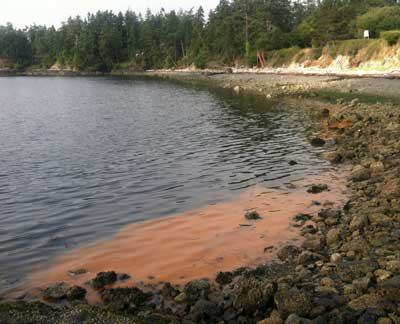The unappetizing red foam seen floating on the surface of inshore marine waters in San Juan County (and in the photo that accompanies this story) is not related to the organism that causes paralytic shellfish poisoning.
But all recreational shellfish harvesting in the county is nonetheless closed because elevated levels of the paralytic shellfish poisoning organism have been detected throughout local waters.
The red algae bloom is not harmful to health in most cases, according to John Manning, county director of Health and Community Services.
Jerry Borchert of the state Department of Health confirmed, however, that high PSP levels in the county caused the state Department of Health to close shellfish harvesting for all kinds of shellfish in the county July 12.
The closure includes oysters and all varieties of clams and mussels. Other Puget Sound and coastal marine areas are also closed for some or all shellfish, so be sure to check the following state website before harvesting and consuming any shellfish anywhere: www4.doh.wa.gov/gis/mogifs/biotoxin.htm.
Borchert and Gary Covington, an environmental health specialist for the county, both pointed out that local shellfish are tested regularly – “every week” when shellfish harvesting is closed, every two weeks when PSP organisms are not found.
Mussels are the indicator species for the PSP organisms that are used for testing, but Covington points out that butter and varnish clams retain toxins for extended periods and sometimes remain closed when other shellfish beds are open.
Covington said that the county’s four commercial shellfish farms test their products whenever they are harvested; currently, only one of four shellfish farms in the county (Buck Bay Shellfish on Orcas) is closed until testing shows reduced biotoxin levels.
— Steve Wehrly



